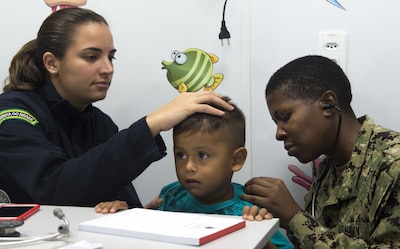By Navy Petty Officer 2nd Class Andrew Brame Navy News
Service
SAN DIEGO, Dec. 5, 2017 — Five Navy doctors recently boarded
the Brazilian navy hospital ship NAsH Soares de Meirelles and began a monthlong
humanitarian mission that will take them deep into the Amazon. These doctors
will be working closely with the Brazilian navy to deliver healthcare to some
of the isolated peoples in the world.
Navy Capt. William Scouten, the mission's medical planner,
said he hopes that this will be the first of many similar endeavors.
"The purpose of this mission is to establish a
long-range collaborative effort that will span over the many years to
come," he said. "The overall intent of this mission is to perpetuate
a regular collaborative experience. This mission is a 'capstone,' where medical
practitioners can experience what they have learned in the classroom."
The U.S. team includes specialists in internal medicine,
general medicine, infectious disease and dermatology.
In addition to providing care to people in remote jungle
villages, these doctors will work together to create a curriculum for
delivering health care to resource-limited areas along the river.
"I am excited to swap cases at the end of each day and
continuously learn about the environment that we will be in," Scouten
said. "Also, learning new perspectives is always something that I look
forward to, because sometimes, the way we do things ... doesn't always
translate well depending on the environment we are in."
Long-Term Collaboration
The curriculum will be a "living" document. On
future missions, Brazilian, U.S. armed forces and civilian clinical specialists
will continue to collaborate on the program, altering it over time to address
changes in disease prevalence, technology and educational priorities.
Scouten said he hopes that this mission will grow to include
other countries and regional partners in the future. Increased readiness and
strengthened relationships, however, are not the only benefit he expects from
missions like this one.
"The long-range goal here is to provide the indigenous
population with a broader array of healthcare that they might not have received
otherwise," he said. "Hopefully, with all the data that we have been
able to collect and will collect, we could be able to identify specific
pathologies, perhaps eradicating, or at least mitigating some of them."

No comments:
Post a Comment